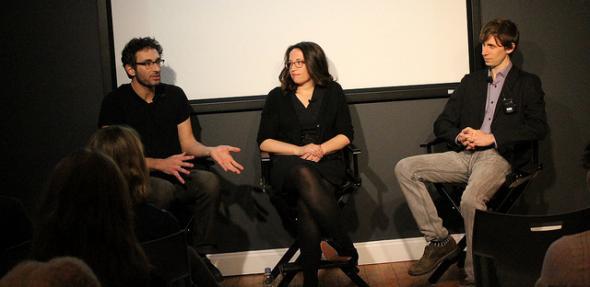Having recently turned 30 and returned to the United States after being a foreign correspondent, Amy Webb, author of Data, a Love Story, decided to get serious about finding a partner.
After bombing out on eHarmony, Match.com, and JDate, she realized: It wasn’t that the sites’ algorithms were wrong—it was that she was entering the data incorrectly. She made a list of the 72 qualities she most valued in a future husband, logged into the sites as a man, and used her various profiles to gather data on how women used the platforms. From that information she created a “super” profile of herself. Not long after, she answered a message from the man she would go on to marry.
Not everyone has the energy or gumption to take this scientific approach to the matter of finding love online. So are the online dating algorithms actually working in our favor, or are they simply changing us?
On Thursday, Feb. 20, Future Tense—a partnership of Arizona State University, the New America Foundation, and Slate—brought together Amy; Aaron Schildkrout, co-founder of HowAboutWe.com; and Slate staff writer Will Oremus in New York to discuss the ins and outs of the online dating world.
This much is clear: It’s all about the algorithms. Aaron told the audience that HowAboutWe.com—a site where users fill out a profile, upload a photo, and propose a first-date idea that other users can respond to—crafts its highly mathematical equations backward from the outcomes it’s trying to achieve. Those outcomes could be getting a first message sent by one user to another, attracting new users, or sending people on one initial date.
“You aren’t building a romantic story, but a really smart math problem,” he said.
Factors such as education, income level (if sites collect it), race, and religion all become part of the algorithm. The problem, Amy suggested, is that a lot of the data that sites ask users to input lacks nuance.
Data can come implicitly from a variety of indicators, rather than just what users enter, Aaron said. “We can also guess user preferences from what browser they’re using, how often they log into the site, and even what email service they subscribe to. I mean, have you ever dated a Hotmail user?”
But has online dating changed us? Will asked Amy and Aaron whether we’re missing out on people we may have had a connection with by over-relying on these supposedly smart algorithms.
Aaron replied that while the speed of dating may have increased because of its migration online, it hasn’t narrowed the pool of potential romantic partners. “It’s not as if a bar or a book club pushes you toward a wider subset of people than a site does online,” he said.
So are we disappointed online daters just doing it wrong?
“The most striking thing we’ve discovered is that humans behave en masse exactly as you’d imagine,” Aaron said. Men care more about vicinity and location than women do, with the obvious hope of physical closeness. And people are still visual: The number of photos users put up is indicative of the number of messages they’ll receive. “If you add four more photos, you’ll get something like 300 percent more messages,” he told the crowd.
People should be optimistic in the language they use, but not try to be too funny, Amy added. In her experiment she discovered that shorter profiles are also better. “Women that you would want to be friends with had profiles of like 3,000 words, but to be good at online dating you should create a curiosity gap.”
It was also clear from the discussion that as technology gets more advanced, we can expect online dating to advance with it. Over the next 15 years, Aaron predicted, the type of data plugged into these systems will begin to include biological information—maybe even brain data.
The data will also get smarter. “We aren’t able to measure actual effectiveness right now,” Aaron said. “We don’t know how the date went and whether there was another one. We have no clue.” But collecting mobile data will tell you. If dating sites track that kind of information, they’ll be able to see that two people are in the same location again and deduce that they went on a second date.
Ideally, a dating service would be not dissimilar to Apple’s OS assistant, Siri, Amy said. “It could look at semantic data sets, device data sets, and would connect and understand what I’m looking for in a way that perhaps I don’t understand myself.” Amy added that we can expect consolidation in the online dating world. It’s already happening, to an extent: Match.com owns OkCupid.
As the event ended, Amy asked every single person in the room to stand up. They did and looked around at one another, laughing nervously. Sometimes, maybe, it’s still as simple as that.
